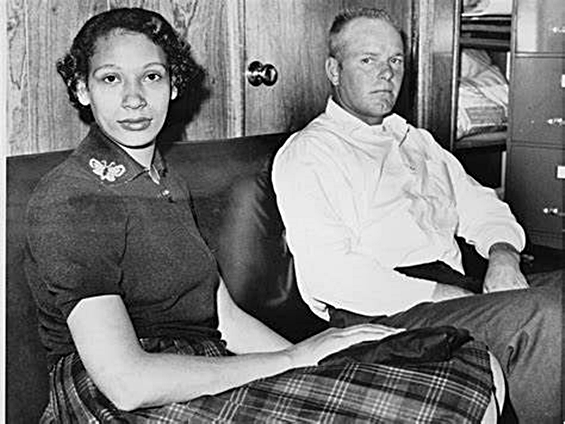Richard and Mildred Loving were at the center of one of the most pivotal civil rights cases in American history, Loving v. Virginia. Their story of love, perseverance, and the fight for justice helped reshape the legal landscape regarding interracial marriage in the United States. Their case ultimately led to the Supreme Court’s decision to strike down laws prohibiting interracial marriage, marking a significant step forward in the battle for civil rights and equality.
Early Life and Love: Richard Perry Loving, a white man, and Mildred Delores Jeter, a woman of African and Rappahannock Native American descent, grew up in rural Virginia during the racially segregated 1950s. Despite the racial tensions of the era and the strict anti-miscegenation laws in Virginia, which made it illegal for people of different races to marry, Richard and Mildred fell deeply in love.
Marriage and Arrest: In 1958, when Mildred became pregnant with their first child, the couple decided to get married. They traveled to Washington, D.C., where interracial marriage was legal, and exchanged vows. Upon their return to Virginia, they were arrested in the middle of the night. Their crime? Violating Virginia’s Racial Integrity Act of 1924, which criminalized interracial marriage. The Lovings were charged with unlawful cohabitation and faced the threat of prison time or exile from the state.
Legal Battle: The Lovings pled guilty in court, and in 1959, they received a suspended one-year prison sentence on the condition that they leave Virginia and not return together for 25 years. Forced to live in exile in Washington, D.C., the Lovings yearned to return to their home state and be close to their families.
Seeking Legal Redress: Mildred Loving, dissatisfied with their exile and determined to fight for their right to be married and live in Virginia, wrote a letter to Attorney General Robert F. Kennedy, who referred her to the American Civil Liberties Union (ACLU). The ACLU took an interest in the case and assigned lawyers Bernard S. Cohen and Philip J. Hirschkop to represent the Lovings.
Supreme Court Case: The case of Loving v. Virginia made its way through the legal system, ultimately reaching the U.S. Supreme Court. In a unanimous decision on June 12, 1967, the Supreme Court ruled that laws prohibiting interracial marriage were unconstitutional. Chief Justice Earl Warren delivered the opinion, stating, “Marriage is one of the ‘basic civil rights of man,’ fundamental to our very existence and survival.”
Impact: The Loving v. Virginia decision not only invalidated Virginia’s anti-miscegenation laws but also set a precedent for other states with similar statutes to strike them down. It was a landmark moment in the civil rights movement, affirming the principle that love and marriage should transcend racial boundaries. The case’s legacy continues to influence legal battles for marriage equality and civil rights.
Later Life: After the Supreme Court’s decision, Richard and Mildred Loving returned to Virginia and lived a quiet life, far from the public eye. They raised their three children and remained married until Richard’s tragic death in a car accident in 1975. Mildred Loving continued to advocate for racial and social justice until her passing in 2008.
The love story of Richard and Mildred Loving serves as a testament to the enduring power of love in the face of adversity. Their courage and determination to fight for their love not only changed their own lives but also helped dismantle a system of discrimination that had persisted for generations. Their legacy as champions of civil rights and marriage equality continues to inspire and resonate with people worldwide.











